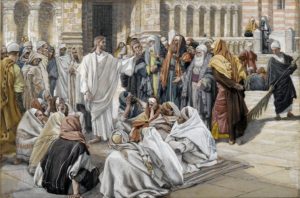I attended the 4th National Convention of Filipino Priests in the whole United States, and some priests were invited from Aruba. It is a joyful gathering of priests as we journey together. There are many opportunities to share and bond together as brothers serving the Lord and His Church. We certainly need to know each other and learn various experiences of our works and ministries. The two states of New Jersey and New York are the hosts of this event.
We listened to the first reading from the book of Exodus which reminded us to develop extra care for the widows and the orphans. God is saying, “Remember how poor, how alienated, and needy you were when I found you. Now you treat others as I have treated you.”
The 2nd reading, taken from the first letter of St. Paul to the Thessalonians, further strengthens our vocation to serve others and to serve God. This is one of the challenges of St. Paul to explain to the people of Thessalonica having a different culture living in that busy city. People are having a big challenge to follow the example of Jesus, to focus seriously on others which gives them profound impact. It is through their acceptance of faith in Jesus that they serve Him by serving others.
The gospel today, taken from St. Matthew, narrates to us another trap by a scholar of the law to entice Jesus into a discrediting situation by asking Him,
“Teacher, which commandment in the law is the greatest?” His direct and simple answer is to love God and to love one’s neighbor, which is the greatest commandment. All the prophets and the other laws depend on these two loves.
Let us again revisit the answer of Jesus as we are confronted with so many destructions in our lives, and how exactly do we understand His thought?
First, the evangelist Matthew presents Jesus as the new Moses, representing the “Law or the Ten Commandments.” Jesus, as the new lawgiver, has summarized and simplified the ten commandments into two commandments: “to love God with all our minds, hearts, strengths and spirit” and the other is, “to love your neighbors as yourself.” It is the same law but made easy by Jesus for us to follow and remember.
Second, we must be aware of the grace bestowed upon us by God. Our dignity, self-worth and Christian identity come from Jesus who has redeemed us. Therefore, the grace of loving others, or our neighbors, is precisely the amount of goodness and love of God we have received. Our identity of being with Christ is the quality that is enough to share and be loving.
Third, our strength to fulfill God’s commandment is by letting God enter our interior life. It is our priority to let God love us from inside. It is the experience of St. Augustine in terms of allowing Jesus to be his personal and communal savior as well, which led him to surrender his total self to Him. Augustine’s former life was less of quality; then after his conversion, God’s grace abounds even more which made him to be the world’s greatest influencer because the graceful quantity expands to his friends and to his followers even now. There is a hope and opportunity to change for the better when we first allow God to touch our lives.
Following the greatest commandment is then to allow us to enter the mystery where God’s hands hold us to share the gifts which we have accepted to be shared.
OUR SPIRITUALITY is to cherish our encounter with God and to establish a relationship with God and others. Our understanding of “others,” or neighbor, relates to how we view ourselves and how we treat ourselves. It is difficult, and yet easy, when we realize that God first loves us and, thus, we too must love others. St. Paul told us that we are not aliens anymore from God because we are redeemed. It means that we are saved from sins and selfishness. To fulfill the law of loving is our response to being love.
God bless you.
Fr. Arlon, osa
————————————
El Dictado del Corazón
Trigésimo Domingo del Tiempo Ordinario, Año A
- Éxodo 22:20-26
- 1 Tesalonicenses 1:5-10
- Mateo 22:34-40
Hoy, estaré asistiendo a la Cuarta Convención Nacional de Sacerdotes Filipinos. Es el único en los Estados Unidos. Algunos de los sacerdotes invitados son de Canadá y Aruba. Es una reunión alegre de sacerdotes que caminan juntos, unidos como hermanos al servicio del Señor y Su Iglesia. Nos da la oportunidad de compartir y conocernos, aprender diversas experiencias de nuestras obras y ministerios. Las dos ciudades de Nueva Jersey y Nueva York son las anfitrionas de este evento.
Escuchamos la primera lectura del libro del Éxodo que nos recuerda que debemos desarrollar un cuidado especial por las viudas y los huérfanos. Dios está diciendo: “Recuerda lo pobre, alienado y necesitado que estabas cuando te encontré. Ahora trata a los demás como yo te he tratado a ti”.
La Segunda lectura, extraída de la primera carta de San Pablo a los Tesalonicenses, fortalece aún más nuestra vocación de servir a los demás y de servir a Dios. Este es uno de los desafíos de San Pablo para explicarle a la gente de Tesalónica, que en esa bulliciosa ciudad vive una cultura diferente. La gente tiene el gran desafío de seguir el ejemplo de Jesús, de centrarse seriamente en los demás, lo que les produce un impacto profundo. Al aceptar la fe en Jesús, le ayuda para servir a los demás.
El evangelio de hoy, tomado de San Mateo, narra otra trampa de un doctor de la ley, para inducir a Jesús a una situación de descrédito preguntándole; Maestro, ¿cuál mandamiento de la ley es el mayor?” Su respuesta directa y sencilla es amar a Dios y amar al prójimo. De estos dos amores dependen todos los profetas y las demás leyes.
Volvamos nuevamente a la respuesta de Jesús mientras nos enfrentamos a tantas destrucciones en nuestras vidas y ¿cómo entendemos exactamente su pensamiento?
Primero, el evangelista Mateo presenta a Jesús como el nuevo Moisés, representando la “Ley o los Diez Mandamientos”. Jesús como nuevo legislador, ha resumido y simplificado los Diez Mandamientos en dos mandamientos: “amar a Dios con toda nuestra mente, corazón, fuerzas y espíritu” y el otro, es “amar a tu prójimo como a ti mismo”. Es la misma ley, pero hizo que Jesús fuera fácil de seguir y recordar.
En segundo lugar, debemos ser conscientes de la gracia que Dios nos ha otorgado. Nuestra dignidad, autoestima e identidad cristiana provienen de Jesús, quien nos ha redimido. Por tanto, la gracia de amar a los demás o al prójimo es precisamente la cantidad de bondad y amor de Dios que hemos recibido. Nuestra identidad de estar con Cristo es la cualidad que basta para compartir y ser amorosos.
En tercer lugar, nuestra fuerza para cumplir el mandamiento de Dios es dejar que Dios entre en lo interior de nuestra vida. Es nuestra prioridad dejar que Dios nos ame desde a dentro. Es la experiencia de San Agustín en términos de permitir que Jesús fuera también su salvador personal y comunitario, la que lo llevó a entregarse totalmente a Él. La vida anterior de Agustín era de menos calidad, luego, después de su conversión, la gracia de Dios abunda en el aún más, lo que lo convirtió en el mayor influyente del mundo porque la cantidad de gracia se expande para sus amigos y seguidores en la actualidad. Hay esperanza y oportunidad de cambiar para ser mejor, cuando permitimos que Dios toque nuestra vida por primera vez.
Seguir el mandamiento más grande, entonces, es permitirnos entrar en el misterio donde las manos de Dios nos sostienen para compartir los dones que hemos aceptado.
NUESTRA ESPIRITUALIDAD es apreciar nuestro encuentro con Dios y establecer una relación con Dios y con los demás. Nuestra comprensión a los “otros” o vecinos se relaciona con cómo nos vemos a nosotros mismos y cómo nos tratamos a nosotros mismos. Es difícil y, sin embargo, fácil cuando nos damos cuenta de que Dios nos ama primero y, por lo tanto, nosotros también debemos amar a los demás. San Pablo nos dijo que ya no somos ajenos a Dios porque somos redimidos, es decir, somos salvados del pecado y del egoísmo. Cumplir la ley del amor es, nuestra respuesta a ser amados.
Dios los bendiga.
P. Arlón, osa

